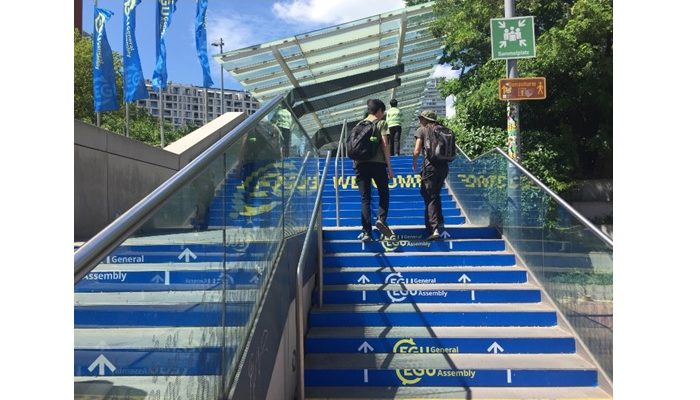
The first hybrid EGU General Assembly (23–27 May 2022) is over. What a great achievement for the organizers and programme committee who managed to bring the community back to the face-to-face world of scientific conferences, while also offering the opportunity to those not able to travel to Vienna to attend it virtually.
We attended the meeting in different ways. Here below our first quick thoughts on this experience.
Bettina, main editor of this blog, was one of the 7,002 virtual attendees from 116 countries (in her case, from Switzerland):
It was a tough decision not to go to Vienna, but the ad-hoc timing in the middle of May made it very challenging from a family-work balance perspective. It was great that I could attend anyway and it was a real pleasure to see from behind the screen how smoothly everything went.
What a strange feeling, however, to give a talk without seeing who is in the actual conference room. I was nervous like during my time as a PhD candidate (in fact, not too bad, after all these years to get “stage fright” again ;-).
Despite of my detailed knowledge of the Vienna Conference Centre (I still have the rooms and halls in mind!), I had a hard time imagining how my projected talk would come across in a conference room.
Helena, president of the Division on Hydrological Sciences (HS), was on site, together with 7,315 other participants from 89 countries; you probably saw her running around, from the green level to the red and blue levels:
With 99 scientific sessions led by the Division on Hydrological Sciences (1,827 abstracts!), I was a bit busy, in particular in the beginning of the week. I wanted to make sure that all sessions started well and to report any technical issues that needed to be quickly checked.
At EGU, the programme committee chairs have a Forum where they can report issues in real-time during the GA, so that those that can be fixed quickly by Copernicus (our conference organizer) can be handled. We also share experiences along the week: how well went the division business meetings; if the medal lectures had good attendance; if remote participation was working well, etc. This is reassuring for division presidents, and helps us gaining confidence and new ideas for community building.
I was also very glad to be able to count on the great scientific officers of our division, who, either on site or online, followed closely the sessions and, when needed and possible, offered support to the conveners.
A great moment for me was the Division business meeting on Tuesday at lunch time (*). The absence of the famous “lunch bags” (we could not have them this year due to Covid) did not discourage our members and we had a full room in Vienna. I was happy to acknowledge all the volunteers who worked hard to make it all happen and to welcome the new ones in the group.
After all, my only regret was that I could not attend as many scientific sessions as I would have liked. There was so much great content in the sessions’ programmes! I look forward to catching up by checking the display materials in the next weeks (**).
(*) You can download the slides presented: HS-Division-Business-Meeting-2022.
(**) All #vEGU22 materials are available online until 30 June 2022.
This first hybrid EGU GA was a much-needed experience
On the one hand, many members of our scientific community, and in particular the Early Career Scientists, wanted to meet their colleagues face-to-face again. This was, by the way, the first in person conference experience for many PhD candidates who started their research one or two years ago.
On the other hand, many could not yet travel across continents or had their plans to travel to Vienna disturbed by the GA date change. In these cases, the possibility to follow some presentations, debates and activities online was the only way to connect or reconnect with the EGU community.
Organizing, running and participating in a hybrid event is, however, not an easy enterprise!
Hybrid meetings need more time and effort to get everything ready for all types of attendees: those on site or online, those with experience in attending conferences or those who are first-time attendees, etc.
It is hard to anticipate all issues that might occur and that might prevent attendees and presenters from having a rewarding experience. Networking activities are more complicated to run, and, in such big meetings as EGU General Assemblies, finding time slots and adapted ways for long enough (but not too long!) presentations and, at the same time, to foster in-depth scientific discussions can be tricky.
In any case, this is a learning process and we are moving forward together, hopefully to an enhanced experience in 2023 (you can already mark it in your agenda: 23–28 April 2023). Extensive feedback is being collected and processed (you can provide your input using the EGU Survey here), and we will be back with more reflections soon!
